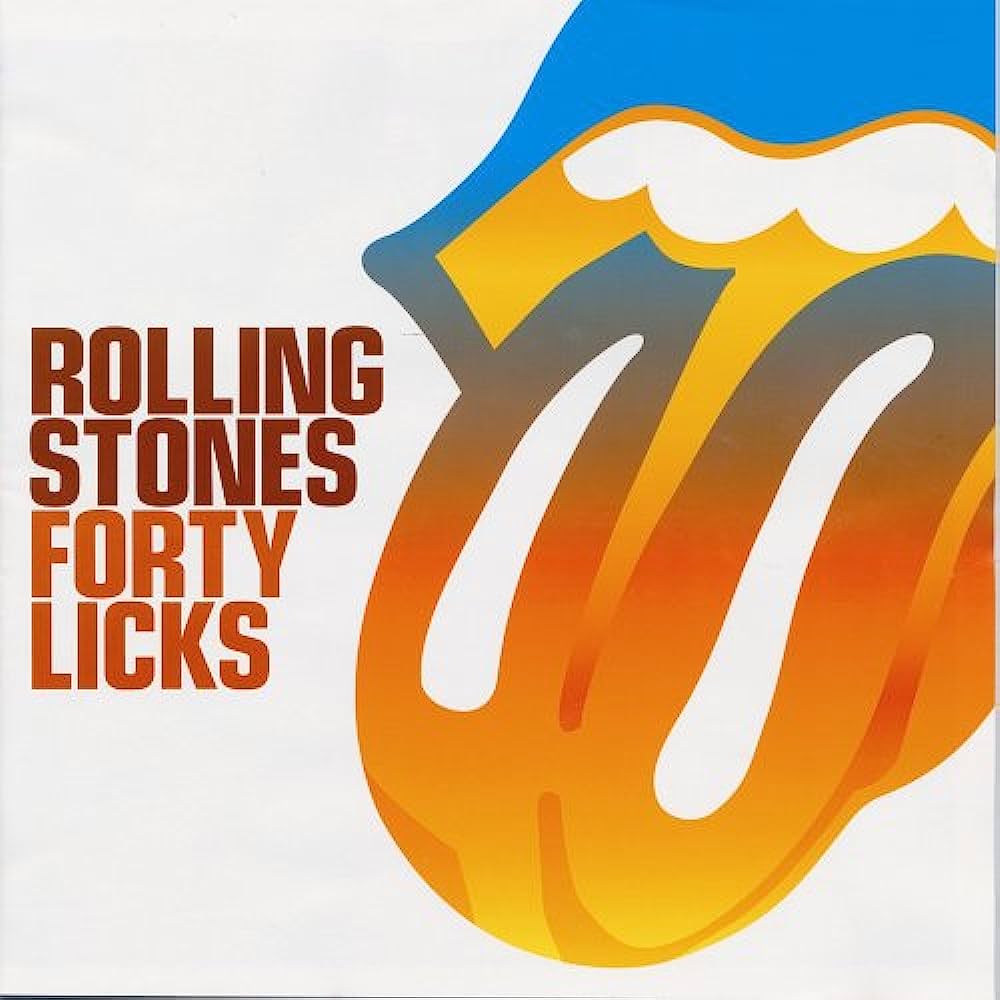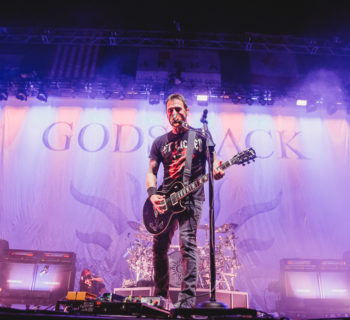The Rolling Stones Forty Licks will be available for the first time on vinyl via UMe.
The collection houses, for the first time, the cherished- loved hits and album tracks from the Stones’ 1960s era and their later releases, after the formation of Rolling Stones Records in 1971.
Forty Licks was initially issued and distributed to mark the band's 40th anniversary and now makes its official vinyl debut as a limited edition 4LP. It's available digitally and in Dolby Atmos, with three tracks new to streaming.
Following its initial issue, Forty Licks would sell seven million copies around the world, and has since come to be seen as the definitive anthology of the band's recording career.
It was, uniquely, the first collection to bring together landmark recordings from all points in their unrivalled songbook, from their early days via Decca UK and London US (ABKCO Records) through to the establishment of their own Rolling Stones Records.
The Rolling Stones - Gimme Shelter (Official Visualiser)
Over a 100 covers of "Gimme Shelter," including Grand Funk Railroad in 1971, Goo Goo Dolls (1989), a 1993 rendition by UK modern rock band Cud with vocals by 1960s pop star Sandie Shaw, and a 2007 single B-side by Stereophonics. In 2023 Eric Church covered the tune for his multi-artist album Stoned Cold Country – A 60th Anniversary Tribute to The Rolling Stones.
The tension in the October, 1969 "Gimme Shelter" recording was heightened by Jagger’s captivating vocal interplay with singer Merry Clayton, who eventually cut her own version of the song with producer Lou Adler in 1970. The same year, The Maysles Brothers-directed documentary Gimme Shelter, which chronicled the Stones' 1969 United States tour, was theatrically released in 1970.
Mick Jagger, who turned age 80 on July 26th, during a September 10, 1970 interview on Danish radio, ruminated about the creation of the tune with songwriting partner Keith Richards.
‘“Gimme Shelter’ is just about the fact that it doesn’t matter how safe you are or think you are safe, something could always happen to you at that very minute or that minute later that could either destroy you or change you in some way. So it means that just because you are safe and secure in your house doesn’t mean that you really are safe.”
Before vocalist Merry Clayton’s spine-tingling haunting vocals were added to those of Mick Jagger on “Gimme Shelter,” Merry had already shared a microphone with Bobby Darin, Pearl Bailey, and was a member of both the Blossoms and Ray Charles’ Raelettes. During her studio career she has sung backup on records with Elvis Presley, Joe Cocker, Phil Ochs, Burt Bacharach and Carole King.
Clayton also starred in director Morgan Neville’s Academy Award-winning Best Documentary Feature 20 Feet From Stardom released in 2013.

By October 1969, the Stones had already prepared the basic rhythm track for “Gimme Shelter” with record producer Jimmy Miller and engineer Glyn Johns in England at Olympic Studios.
Jagger, Richards, Miller and Johns in late October relocated to Elektra Studios in Los Angeles with engineer Bruce Botnick who had previously worked on albums with Love and The Doors.
“First of all, Glyn Johns did all of the recording,” Botnick volunteered to me in a 2009 interview. “I facilitated and worked as a second engineer to get him through the night. Glyn did a great job. And he was under a lot of pressure with them.
“The first playback of ‘Gimme Shelter’ was incredible…On the Let It Bleed album I made suggestions and brought in the country music fiddle player Byron Berline for ‘Country Honk.’”
“Gimme Shelter” songwriters Mick and Keith, Miller along with longtime associate multi-instrumentalist Jack Nitzsche huddled during their October 18th -27th Southern California studio visit just before the Stones embarked on their US tour in November ’69.
Nitzsche was an omnipresent figure and key Stones’ collaborator on over a half a dozen of their previous LP’s. Jack was a major contributor to Aftermath and Between the Buttons albums. His keyboard and percussion efforts are evident on “Satisfaction,” “Let’s Spend the Night Together,” “Yesterday’s Papers,” and “Sister Morphine.”
“I met the Stones in 1964,” recalled Nitzsche during a 2000 home interview. “Their manager and record producer Andrew Loog Oldham called me up. It was at RCA studios in Hollywood and I was working with Edna Wright, Darlene Love’s sister. A little later, the Stones started working at RCA and it had a big impact on me, a whole new way of approaching records. I was used to a three hour record date, and they were block booking 24 hours a day for two weeks, and doing what they wanted.
“I got them into The T.A.M.I. Show. I put the band together and did all the arrangements. I was the musical director."
“I always thought…As long as me and Charlie could get it together, then the rest of the band could do what they’d like and it worked,” suggested bassist Bill Wyman in a 2002 interview we conducted. “And that’s what happened in the studio, and that’s what happened live.
“Me and Charlie were really always on the ball, always straight, always together and had it down. If we had our shit together we got it right. What he was doing and what I was doing, standing next to him and watching his bass drum, and all that, which a lot of bass players don’t do, stupidly, once we got our thing going, and the group was there, then anything could happen. That’s all there was. There was simplicity. It wasn’t how many notes you played, it’s where you left nice holes and I learned that from Duck Dunn and people like that.”
Initially, Jagger, Richards, Miller and Jack had intended to utilize Bonnie Bramlett of Delaney & Bonnie for the role Clayton filled, but she wasn’t available, possibly due to illness or alleged reports that Bramlett's husband, Delaney refused to let her work with the Stones. He had met them in 1965 on the set of the television series Shindig!
Nitzsche then suggested Clayton to augment the hypnotic and weaving guitar efforts of Keith, who sang on the recording as well, along with the propulsive drum work of Charlie Watts, pianist Nicky Hopkins, Bill Wyman on bass, percussionist Miller, and Jagger’s harmonica playing.
Sadly, the now unreliable Brian Jones wasn’t on “Gimme Shelter” but had been in attendance when the initial “Gimme Shelter’ session was done in England at Olympic. Jones does appear on “Midnight Rambler” on percussion and played autoharp on “You Got the Silver” for Let It Bleed.
“Jack phoned me at home from the studio in the Los Angeles area one night where I lived with my husband, Curtis Amy,” remembered Merry Clayton in a 2008 telephone interview we did. [Amy was a legendary jazz musician himself, known for his classic album with Dupree Bolton, Katanga!).
“Jack called and Curtis told him I was just about ready to go to sleep. See, I was pregnant,” disclosed Merry, “but Jack insisted that he had to talk to me about this Stones’ session immediately as I was about to go to sleep. Curtis then woke me up. Jack was on the line. ‘Merry, I really need you to do this part. There is no other singer who can do this. Please.’
“I always loved Jack, like Lou Adler, he always took a chance on me. I worked with Jack on the Performance soundtrack he did and I had worked with Jack earlier on a record he did with Neil Young in 1968 or ‘69. ‘OK…’ I was really tired that night, but I got up, put on my coat, got in the car with Curtis and we drove up La Cienega Blvd. to Hollywood later that evening where the studio was located.”
Arriving with her hair in curlers, Clayton was warmly greeted by Keith Richards, and then checked out Mick Jagger in the flesh. “‘Man, I thought you was a man, but you nothing but a skinny little boy!’
“They played me the song and asked if I could put a little somethin’ on it…I said, ‘stop the song and tell me what all this stuff meant’ before I went any further. ‘It’s just a shout or shot away’ was something in the lyrics. I said, ‘I’m gonna put my vocal on it and I’m gonna leave. ‘Cause this is a real high part and I will be wettin’ myself if I sing any higher!’ ‘Cause my stomach was a little bit heavy…”
Just before her vocals were added on the track, Merry, no rookie in the music business, had politely voiced concerns about payment procedure and credits.
“So, we went in and did it. Matter of fact, I did it three times. I didn’t do an overdub. Mick’s vocal was already on it when I heard it and I recall he did a bit of touching up after I left. But they got what they wanted,” reinforced Merry.
“‘It was so nice meeting you guys.’ ‘Oh Merry you sound incredible. We just love you. We’re gonna work with you…’ I was walkin’ out the door as they were talkin’. ‘OK. ‘Love you guys, too! See you some other time…’
“And I got in the car with my husband who took me right home and I went right upstairs to bed. And that was the ‘Gimme Shelter’ session.
Very swiftly the Stones’ legal team generated an agreement requesting her signature. “Next thing I knew, lawyers had talked and everything was cool. And, it was a go on the record.”
Partially owing to physical strain exerted on “Gimme Shelter,” Clayton suffered a miscarriage shortly after returning home.
“Then I immediately heard it on the radio in Los Angeles. It’s a powerful track,” admitted Merry, who was credited as Marry Clayton on the initial Let It Bleed LP pressings.
“My dad was a Bishop at church,” reinforced Clayton, “and he heard it and said, ‘Merry, what is this line in the song about rape and the murder?’ ‘Well dad, that’s part of the song.’ And he laughed. ‘Boy, they’re really singing them different these days.’ I call him Reverend Doctor Daddy. ‘You know they’re singing them different these days and that’s what it is.’
‘“Well you know, just remember one thing,’” he replied, “remember as you go out there on the road and travel on the road with the Rollin’ Cockers, ‘cause I worked with Joe Cocker, too, so he could never get the names together, ‘Just remember when you are out there with the Rollin’ Cockers, daddy is prayin’ for you.’ ‘Oh daddy, I need that so bad. Thank you so much.’ And he added, ‘do it while you’re young ‘cause when you get older you’re not going to run up and down the road.’
“My father always encouraged me to do things with class, dignity and integrity,” underlined Clayton, a graduate of Jefferson High School’s music department in Los Angeles under renowned instructor Sam Browne.
I remember when KMET-(94.7) FM in Los Angeles first spun “Gimme Shelter” from an acetate dub they acquired just before Let it Bleed shipped to retail outlets. I discovered Merry Clayton’s voice coupled with Jagger’s lead. I was stunned. Clayton is both sonic witness and participant in this dark doomsday warning.
“In a way, maybe when you write songs without even knowing it, you’re kinda saying, ‘can I do this live?’ And so in a way you add that in,” Keith Richards stressed to me in a 1997 interview around a Rolling Stones’ concert in San Diego, California.
“You don’t know if it’s gonna work, but I guess what you keep in the back of your mind is, ‘We’re making a record here; what happens if they all like it and we gotta play it live?’ So, in a way, maybe in the back of the mind that sets up the song to be playable on stage,” underlined Keith.
“It’s another thing. Once you’re on the stage it’s just some floor boards in spite of it. And you’re not really aware of everything you are seeing. But what really keeps tours going and alive for the band and therefore for the audience I think is to change it and to play the smaller joints indoors. And the small stage with the show. It’s necessary to change the scale sometimes. Otherwise you can really get used to the large thing. And you realize when you’re playing a small gig that you get dynamics back and you can re-translate that back to the big stage.”
“Gimme Shelter” was debuted on the Rolling Stones ’69 United States tour. I then really heard the number performed at their two November Southern California concerts in Inglewood at the Fabulous Forum that I attended as a teenager which made an indelible impression. And still does. The first show started on November 8th at 11:45 pm and the second one spilled into November 9th ending at 5:15 am.
“ Definitely the greatest backing vocal of all time - still remember hearing it in '72 on the car radio in my brother's 65 Mustang and a guy named Alex Hajdu in the front seat yelling, ‘That's Merry Clayton!’ when the chorus kicked in," enthused film producer and movie director Michael Hacker. "It made such an impression on me cause I'd never heard anyone single out a backup singer before.”
Over the last 50 years the “Gimme Shelter” master tape has been licensed by ABKCO for broadcast in many feature films: Adventures in Babysitting, GoodFellas, Casino and 20 Feet From Stardom. It’s been utilized in television: The Simpsons, Dexter, Nip/Tuck and The Vietnam War. It’s was also incorporated as a trailer for the Discovery Channel’s When We Left Earth, which documented the NASA space missions.
During a 2015 Jazz Foundation annual benefit concert, A Great Night In Harlem, held at the Apollo Theater in New York, Keith Richards and members of his X-Pensive Winos band, Lisa Fischer and Bernard Fowler, along with Sarah Dash, paid tribute to Merry Clayton who was severely injured in a near fatal car accident in 2014 losing both her legs at the knees.
Richards and company performed “Gimme Shelter” at the venue. Clayton, who was unable to attend the tribute, accepted the Clark and Gwen Terry Award for Courage via a pre-recorded message.
(On October 16, 2023, ACC ART BOOKS LTD is publishing THE ROLLING STONES: ICONS. 312 pages. $75.00. Introduction is penned by author Harvey Kubernik. Spanning six heady decades, and countless tours and album covers, this thrilling portfolio features imagery from some of the most eminent names in photography, alongside the photographers’ own memories and reflections. Includes photographs by Terry O’Neill, Gered Mankowitz, Linda McCartney, Ed Caraeff, Ken Regan, Douglas Kirkland, Dominque Tarle and founding member, bassist and photographer, Bill Wyman. Each photographer has selected images for their chapter and written an introductory text about their time working with the band
Harvey Kubernik is the author of 20 books, including 2009’s Canyon Of Dreams: The Magic And The Music Of Laurel Canyon, 2014’s Turn Up The Radio! Rock, Pop and Roll In Los Angeles 1956-1972, 2015's Every Body Knows: Leonard Cohen, 2016's Heart of Gold Neil Young and 2017's 1967: A Complete Rock Music History of the Summer of Love.
Sterling/Barnes and Noble in 2018 published Harvey and Kenneth Kubernik’s The Story Of The Band: From Big Pink To The Last Waltz. In2021 they wrote Jimi Hendrix: Voodoo Child for Sterling/Barnes and Noble. In 2023, Harvey and Kenneth signed a book deal with Insight Editions for a large format volume housing the 1968-1980 music photographs of Ed Caraeff scheduled for 2024 publication.
Otherworld Cottage Industries in 2020 published Harvey’s Docs That Rock, Music That Matters.
Harvey's writings are in several book anthologies. Most notably, The Rolling Stone Book Of The Beats and Drinking With Bukowski. Harvey wrote the liner notes to the CD re-releases of Carole King’s Tapestry, The Essential Carole King, Allen Ginsberg’s Kaddish, Elvis Presley The ’68 Comeback Special, The Ramones’ End of the Century and Big Brother & the Holding Company Captured Live at The Monterey International Pop Festival.
During 2006 Harvey spoke at the special hearings initiated by The Library of Congress held in Hollywood, California, discussing archiving practices and audiotape preservation. In 2017 Harvey Kubernik appeared at the Rock and Roll Hall of Fame in Cleveland, Ohio, as part of their Distinguished Speakers Series.
During 2022, producer/director Ron Chapman interviewed Harvey and hired him as a consultant for his music documentary, REVIVAL69: The Concert That Rocked the World, which celebrates and chronicles a 1969 rock festival in Toronto, Canada that spotlighted the debut of John Lennon's Plastic Ono Band along with the Doors, Alice Cooper, Chuck Berry, Little Richard, Bob Diddley, Jerry Lee Lewis and Gene Vincent. Shout! Factory has picked up the title for North American distribution.
In 2023, Harvey, photographer Henry Diltz and authors Eddie Fiegel, Barney Hoskyns and Chris Campion were filmed by French director France Swimberge for her Mamas & Papas documentary. Broadcast scheduled on the European arts television channel, Arte. Kubernik is the consultant for the film.
Kubernik was an on-screen interview subject for director O’Casey in 2019 on his BBC4-TV digital arts channel Christine McVie, Fleetwood Mac’s Songbird. The cast includes Christine McVie, Stan Webb of Chicken Shack, Mick Fleetwood, Stevie Nicks, John McVie, Christine’s family members, Heart’s Nancy Wilson, Mike Campbell, and Neil Finn.
Harvey was lensed for the 2013 BBC-TV documentary on Bobby Womack Across 110th Street, directed by James Meycock. Bobby Womack, Ronnie Wood from the Rolling Stones, Regina Womack, Damon Albarn of Blur/the Gorillaz, and Antonio Vargas are spotlighted.
In 2014, Kubernik was a consultant and interview subject for an hour-long examination of the musical legacy of Los Angeles for the Australia television series Great Music Cities for Australian subscription television broadcaster XYZnetworks Pty Ltd (www.xyznetworks.com.au). Slash, Brian Wilson, Steve Lukather and Keith Richards were also filmed. Senior Producer is Wade Goring for Australian music television channel MAX.














